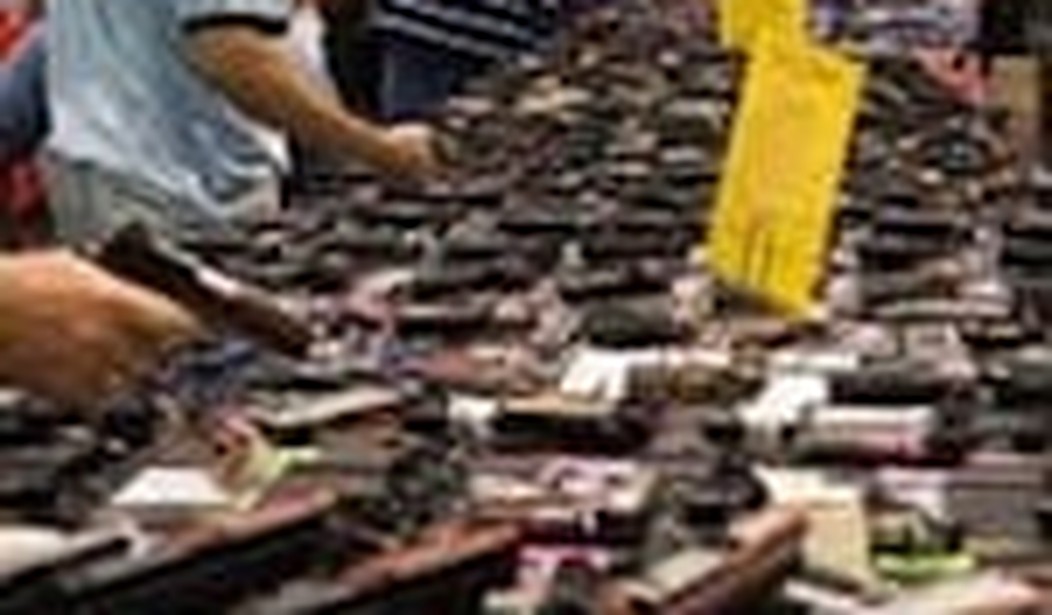A recurring demand of the gun-control movement is the abolition of what they call the “gun show loophole”; they insist that all private party firearms transfers should be subject to a background check just like the background check that licensed dealers must perform. Of course, this is not a loophole specific to gun shows — it is an issue with all private party firearms transfers, including newspaper ads, garage sales, and transfers between friends and family members.
In the abstract, I don’t have a problem with the idea of requiring private party firearms transfers to go through a background check. There is one category of private party sale where a national background check requirement could be of some real value: that is when the purchaser is mentally ill, but has moments of lucidity during which he can find someone willing to sell him a gun.
I suspect that most of the time a person who is obviously mentally ill attempts to buy a gun, the seller declines to do so — and not because he is public-spirited, but out of fear that the person might use the gun on him. Those times of lucidity represent a real danger to the general public, but when you start looking at how to implement such a law, the argument for such a law rapidly declines.
There is another difficulty with a national background check system: in every scheme that I can imagine, an inevitable result will be some sort of firearm registration. To enforce the law against unchecked private party sales requires tracking down the last owner of a firearm found in a prohibited person’s possession — this requires keeping records of a serial number and the lawful owner. Many Americans are concerned that firearms registration will inevitably lead to some future confiscation, and you don’t need to be paranoid to think that: the second director of Handgun Control Inc. (the organization that today is the Brady Campaign) said explicitly in a 1976 New Yorker interview that registration was one of the steps towards the long-term goal of confiscation. More recently, gun-control advocates speaking in favor of confiscation of existing, legally owned firearms demonstrate that this is not paranoia but reasonable concern.
Another problem with the idea of requiring private parties to go to the national background check system is that it is not immediately clear how widespread this problem really is. Logic suggests that it should be a serious problem; but some curious incidents make you wonder.
In September of 2007, there was a gunfight in Miami in which four police officers were shot; one died. The first reports identified a Kevin Wehner as the suspect in these killings, described by one newspaper as “a Jacksonville resident with no criminal record.” But Kevin Wehner went to the police immediately after seeing himself identified as the killer, and explained what had happened. A man named Shawn Labeet had stolen Wehner’s identity, and had a driver’s license with Kevin Wehner’s name. Labeet was registering cars in Wehner’s name, and more: “Between December 2005 and March 2006, Labeet bought nine guns, six assault rifles and three pistols” using Wehner’s identity. The reason was simple: Labeet had a criminal record and could not purchase guns using his own identity.
Hmm: I thought it was really easy for criminals to buy guns through the “gun show loophole.” Why bother stealing someone’s identity to buy guns? Is this loophole less useful than it appears?
An interesting study raises questions about how dangerous this loophole really is. Mark Duggan, Randi Hjalmarsson, and Brian A. Jacobs are professors at the University of Maryland and the University of Michigan. In 2008, they published a paper titled “The Effect of Gun Shows on Gun-Related Deaths: Evidence from California and Texas.” Duggan had previously published papers that could be considered supportive of gun control, and so this paper he co-authored is especially interesting.
They studied murders and suicides in the three weeks following gun shows in these two states. What they found was that suicide and homicide rates in California were unaffected by gun shows; this is not terribly surprising because California prohibits private party sales without background check. (Gun suicides increased, but non-gun suicides fell by the same amount.) In Texas, where there are no restrictions on private party sales, they found that gun homicides actually fell following gun shows, while suicides and non-gun homicides were unchanged.
Obviously, gun shows represent only one part of these unchecked private party firearms sales. Yet gun shows are the example that the gun-control activists constantly harp on as the reason for a broad national background check requirement. Is it possible that criminals are too stupid to buy guns at gun shows? Or is it possible that they prefer to obtain guns in less expensive ways, such as by theft?
A national background check requirement won’t do anything about theft.
Let me suggest another strategy that would be just as effective without this complexity: current federal law severely punishes (or least can severely punish) possession of a firearm by certain prohibited categories of persons. In places where the combination of state and federal governments have worked aggressively to punish convicted felons in possession, the results have been impressive.
Perhaps instead of creating more “crimes” and more opportunities to punish people, we should put our focus on the core problem: people already prohibited from possessing firearms who refuse to follow those laws.









Join the conversation as a VIP Member